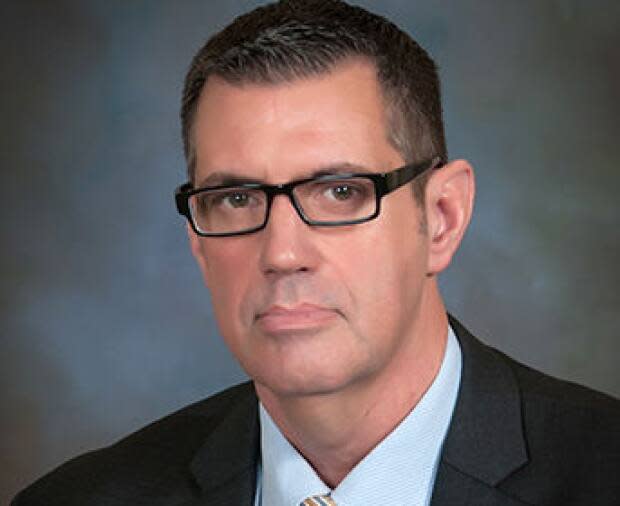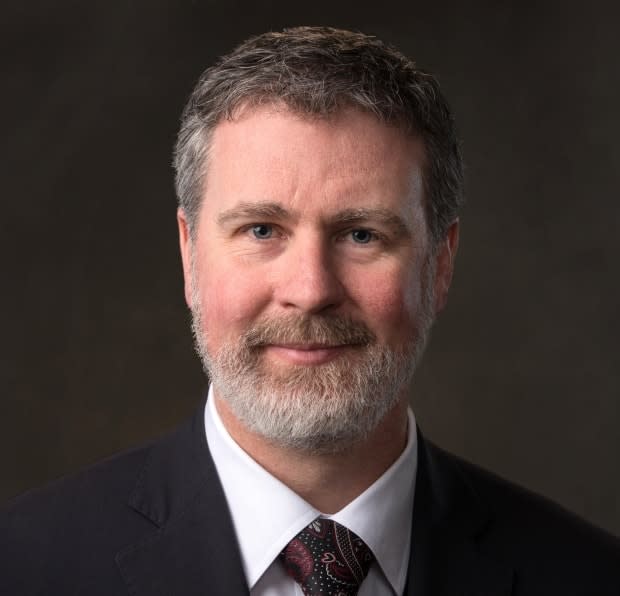How the pandemic has changed funerals and grieving in Nova Scotia

Funeral directors in Nova Scotia have had a year of trying to comfort families with just their eyes, and bringing loved ones from around the world together virtually.
Although it's been difficult, those in the industry say many of the changes have been for the better — and will allow more flexibility and safety even after the COVID-19 pandemic is under control.
"Normally for Maritimers, we come together, we hug, we cry, we talk, we tell stories and we eat. We removed all that," said Dwayne Isenor, the location manager for Cruikshanks Funeral Home in Halifax.
"It's a very traditional industry, so change doesn't come quick, but we had to change on a dime."
Isenor said one of the hardest things to navigate this past year has been not being able to hug or physically console grieving families, but instead trying to show compassion with the eyes while wearing a mask and standing two metres apart.
Having the regulations change back and forth regularly has also been a learning curve to manage, Isenor said. Even though at one point families might have hoped for 10 people to attend a service, the next day regulations might only allow two, he said.
They quickly figured out where to get computer tablets and how to set up video recording or streaming options for family and friends from around Canada or outside the country who wanted to be part of funerals, Isenor said.

"I'm pretty proud that we've gotten pretty good. We've had some really positive feedback that was like, 'Wow, I didn't think we would be able to do this. You made it personal without people actually being in the room,'" Isenor recalled.
Staff roles also became much more flexible. Isenor said no matter what your job was, some days you might be sanitizing pens because a fresh one was needed for every person to sign the condolences book, or standing at the door taking people's information for contact tracing.
And sometimes, especially at the beginning of the pandemic, the staff would leave the building so they didn't count under the gathering limits and families could fit more people in.
One change that will likely stay is traffic flow in one door and out another so people don't pass closely, Isenor said. Even during a regular winter, flu season can make it hazardous to bring lots of groups of seniors together for a funeral under one roof.
With their new flexibility, Isenor said there's now nothing they can't accommodate — whether that's service sizes, video needs or a family on a smaller budget.
Although he understands some people might not want to hold a service for various reasons, especially now, Isenor urges people to come together and deal with loss when it happens.
"Part of life is dying. Don't hide from it. Understand it, and what it is, but let yourself grieve and mourn. It's human. It's natural."
Cruikshanks has also handled the funerals of those who have either passed away from COVID-19, including many from last spring's Northwood nursing home outbreak in Halifax, or tested positive for the virus but died from other causes.
Isenor said at this point there's no difference in how a service takes place between someone who had the virus when they died, and someone who did not.
This differs slightly depending on the province or specific funeral home. One Toronto funeral director who spoke with CBC's The Sunday Magazine this February said they do not go through the regular embalming processes, or allow open-caskets and visitations due to concerns over infection.
Patrick Curry, acting president of the Funeral Services Association of Nova Scotia, said there was indeed lots of uncertainty over how to handle the bodies of people with COVID-19 in the early weeks of the pandemic.
But, after conversations with Dr. Robert Strang, the province's chief medical officer for health, Curry learned there's no real risk of infection during a service due to the nature of the virus and the embalming process.
"I don't feel uncomfortable at all," said Curry, whose family runs a funeral home in Antigonish, N.S.
Curry agreed with Isenor that video streaming options are here to stay, especially since in today's age families are scattered much farther than ever before. Even before COVID-19, it could be tough to return home from another country for a funeral, he said.

Many families have also brought up the idea of having a small service right away, but then a larger wake or reception in the future when restrictions have mostly lifted, Curry said.
People will always need to find a way to grieve for a loss, and communities need to find a way to support those people, Curry said.
He is hopeful those larger events can happen soon, but he also said people should permit themselves to grieve when they can't have a certain type of funeral for someone, or must miss out on a parent's service.
"None of those things are fair. And you're perfectly valid in acknowledging that, and feeling that," Curry said.
As of early April, gathering limits for funeral services were up to 50 cent of the venue's capacity up to a maximum of 100 people indoors, or 150 outside. But physical distancing and mask requirements are still in place, and receptions full of tea, sweets and tears cannot be held yet.
Both Isenor and Curry are counting the days until they can cross that distance, and offer a hug or handshake for grieving Nova Scotians once again.
MORE TOP STORIES

